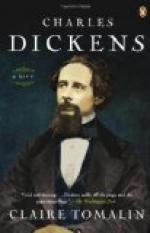But to return. Dickens, it need scarcely be said, had by this [time][8] long out-lived the sickliness of his earlier years. The hardships and trials of his childhood and boyhood had served but to brace his young manhood, knitting the frame and strengthening the nerves. Light and small, as Carlyle describes him, he was wiry and very active, and could bear without injury an amount of intellectual work and bodily fatigue that would have killed many men of seemingly stronger build. And as what might have seemed unfortunate in his youth had helped perchance to develop his physical powers, so had it assisted to strengthen his character and foster his genius. I go back here to the point from which I started. No doubt a weaker man would have been crushed by such a youth. He would have been indolently content to remain a warehouse drudge, would have listlessly fallen into his father’s ways about money, would have had no ambition beyond his desk and salary as a lawyer’s clerk, would have never cared to piece together and supplement the scattered scraps of his education, would have rested on his oars when he had once shot into the waters of ordinary journalism. With Dickens it was not so. The alchemy of a fine nature had transmuted his disadvantages into gold. To him the lessons of such a childhood and boyhood as he had had, were energy, self-reliance, a determination to overcome all obstacles, to fight the battles of life, in all honour and rectitude, so as to win. From the muddle of his father’s affairs he had taken away a lesson of method, order, and punctuality in business and other arrangements. “What is worth doing at all is worth doing well,” was not only one of his favourite maxims—it was the rule of his life.
And for what was to be his life work, what better preparation could there have been than that which he received? I am far from recommending warehouses, squalid solitary lodgings, pawnshops, debtors’ prisons,—if such could now be found,—ill-conducted private schools,—which probably could be found,—attorneys’ offices, and the hand-to-mouth of journalism, as constituting generally the highest ideal of a liberal education. I am equally far from asserting that the majority of men do not require more training of a purely scholastic kind than fell to Dickens’ lot. But Dickens was not a bookish man. His genius did not lie in that direction. To have forced him unduly into the world of books would have made him, doubtless, an average scholar, but might have weakened his hold on life. Such a risk was certainly not worth the running. Fate arranged it otherwise. What he was above all was a student of the world of men, a passionately keen observer of the ways of humanity. Men were to be his books, his special branch of knowledge; and in order to graduate and take high honours in that school, I repeat, he could have had no better training. Not only had he passed through a range of most unwonted experiences, experiences calculated to quicken to the uttermost his superb faculties of observation and insight; but he had been placed in sympathetic communication with a strange assortment of characters, lying quite out of the usual ken of the literary classes. Knowledge and sympathy, the seeing eye and the feeling heart—were these nothing to have acquired?




